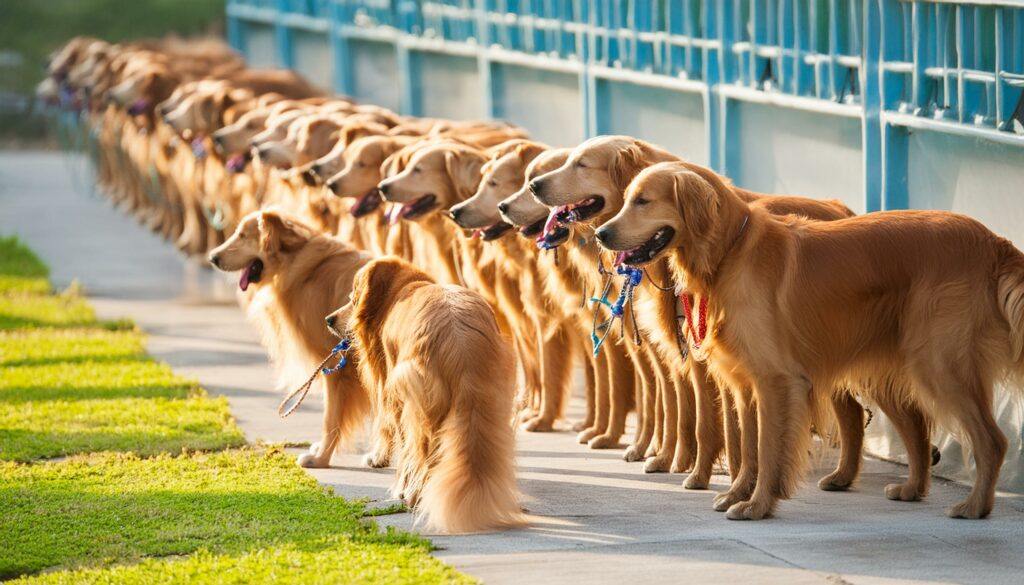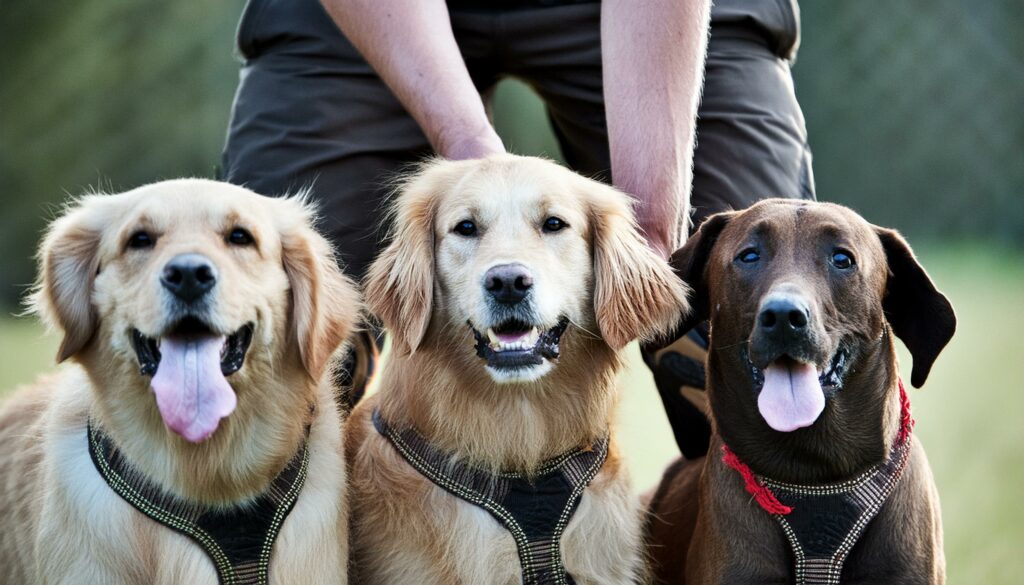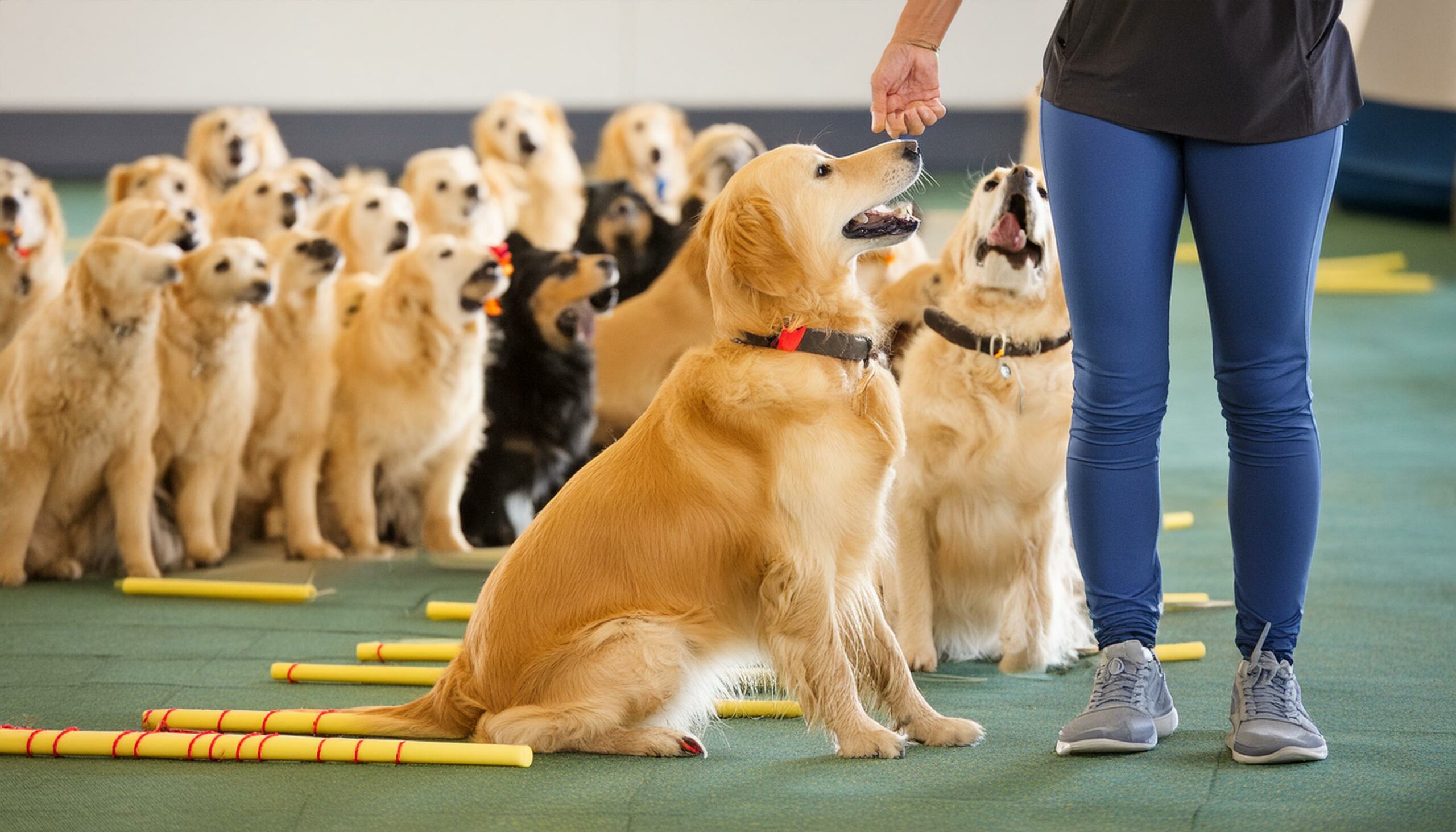Golden Retrievers are renowned for their gentle temperament and sociable nature, making them popular choices for families. Training plays a pivotal role in shaping their behavior and fostering a harmonious relationship with their owners. In this article, we’ll delve into the characteristics of golden retrievers, explore various training techniques, discuss potential challenges, and offer tips for successful training sessions.
Characteristics of Golden Retrievers
Golden Retrievers possess several traits that contribute to their trainability. Their friendly disposition and eagerness to please make them receptive to training commands. Additionally, their high intelligence and quick learning ability enable them to grasp concepts with relative ease. Despite their intelligence, they also have high energy levels, which require proper channeling through regular exercise and mental stimulation.
Training Golden Retrievers: Basics
Importance of Early Socialization
Early socialization is crucial for golden retrievers to develop into well-adjusted adult dogs. Introducing them to various environments, people, and animals at a young age helps prevent fearfulness and aggression towards unfamiliar stimuli.
Establishing Leadership
Establishing yourself as the pack leader is essential in training golden retrievers. Consistent enforcement of rules and boundaries conveys leadership and helps establish a respectful relationship between the dog and its owner.
Consistency in Training Methods
Consistency is key to successful training. Using the same commands and techniques reinforces learning and prevents confusion for the dog. Consistent training schedules also help establish routines and expectations.
Positive Reinforcement Training
Positive reinforcement is a highly effective training method for golden retrievers. This approach involves rewarding desired behaviors with treats, praise, or playtime, reinforcing the behavior and encouraging its repetition.
Definition and Benefits
Positive reinforcement focuses on rewarding desirable behaviors rather than punishing undesirable ones. It creates a positive association with training, making the dog more eager to learn and participate in training sessions.
Examples of Rewards
Rewards can vary from treats and toys to verbal praise and affectionate gestures. Finding what motivates your golden retriever is key to effective positive reinforcement training.
Importance of Positive Reinforcement
Positive reinforcement strengthens the bond between the dog and its owner and encourages desired behaviors through positive association. It also fosters a positive learning environment, making training sessions enjoyable for both the dog and its owner.
Training for Specific Commands
Training golden retrievers involves teaching them essential commands for obedience and safety.
Sit, Stay, and Come
Commands like sit, stay, and come are fundamental for obedience and control. Consistent practice and positive reinforcement help reinforce these commands in various situations.
Leash Walking
Teaching a golden retriever to walk politely on a leash requires patience and consistency. Positive reinforcement techniques, such as rewarding loose leash walking, encourage desired behavior during walks.
Basic Obedience
Basic obedience commands lay the foundation for a well-behaved dog. Consistent practice of commands like sit, stay, and down helps instill discipline and control.
Challenges in Training Golden Retrievers

Despite their intelligence and eagerness to please, golden retrievers may present some challenges during training.
Distractions
Golden Retrievers are social animals and may become easily distracted by people, animals, or new environments during training sessions. Consistent redirection and patience are essential to maintain focus.
Handling Energy Levels
Golden Retrievers have high energy levels, which can make training sessions lively but also challenging. Providing adequate physical exercise and mental stimulation helps channel their energy constructively.
Patience
Training a golden retriever requires patience and consistency. Progress may be gradual, but with patience and positive reinforcement, desired behaviors can be achieved over time.
Advanced Training and Activities
Golden Retrievers excel in various advanced training activities and can participate in specialized roles.
Agility
Agility training involves navigating obstacle courses and requires speed, coordination, and focus. Golden Retrievers enjoy the physical and mental challenge of agility training.
Retrieving Games
Golden Retrievers have a natural instinct for retrieving objects, making games like fetch an enjoyable and mentally stimulating activity.
Therapy and Service Work
Their friendly demeanor and gentle nature make golden retrievers well-suited for therapy and service dog roles. Specialized training prepares them for assisting individuals with physical or emotional needs.
Training Tips for Owners
Patience and Consistency
Patience and consistency are essential virtues in training golden retrievers. Progress may be gradual, but consistent practice yields rewarding results.
Seeking Professional Help
If facing challenges in training, seeking guidance from a professional dog trainer can provide valuable insights and support tailored to your dog’s specific needs.
Understanding Breed Needs
Understanding the breed-specific needs of golden retrievers, including ample exercise, mental stimulation, and socialization, ensures a fulfilling and successful training experience.
Common Mistakes to Avoid
Inconsistency
Inconsistent training undermines progress and confuses golden retrievers. Establishing a regular training schedule and sticking to it is crucial for effective learning.
Punishment-Based Methods
Punishment-based methods can lead to fear and anxiety in golden retrievers, damaging the trust between the dog and its owner. Positive reinforcement is a more humane and effective approach.
Neglecting Mental Stimulation
Golden Retrievers thrive on mental stimulation as much as physical exercise. Neglecting mental enrichment can result in boredom and destructive behaviors.
Benefits of Well-Trained Golden Retrievers

Well-trained golden retrievers bring numerous benefits to their owners and the community.
Strong Bond
Effective training strengthens the bond between golden retrievers and their owners, fostering mutual trust and respect.
Safety and Control
A well-trained golden retriever responds reliably to commands, ensuring safety and control in various environments, such as public outings or encounters with other dogs.
Improved Behavior
Training instills good behavior and manners in golden retrievers, making them pleasant companions at home and in social settings.
Conclusion
In conclusion, while training any dog requires time, patience, and dedication, golden retrievers are generally considered easy to train due to their friendly disposition, intelligence, and eagerness to please. With the right approach, consistent training, and plenty of positive reinforcement, golden retrievers can become well-behaved and obedient companions for life.
FAQs (Frequently Asked Questions)
Are golden retrievers suitable for first-time dog owners?
Yes, golden retrievers are often recommended for first-time dog owners due to their friendly nature and trainability.
Do golden retrievers require a lot of exercise?
Yes, golden retrievers are active dogs that require regular exercise to stay healthy and happy.
At what age should I start training my golden retriever?
Training can begin as early as 8 weeks old with basic obedience commands and socialization.
How long does it take to train a golden retriever?
Training duration varies depending on the individual dog, consistency of training, and desired level of obedience, but basic manners can typically be established within a few months.
What if my golden retriever is stubborn during training?
Patience and positive reinforcement are key. Consistent training and understanding the breed’s characteristics can help overcome stubbornness and achieve desired results.
